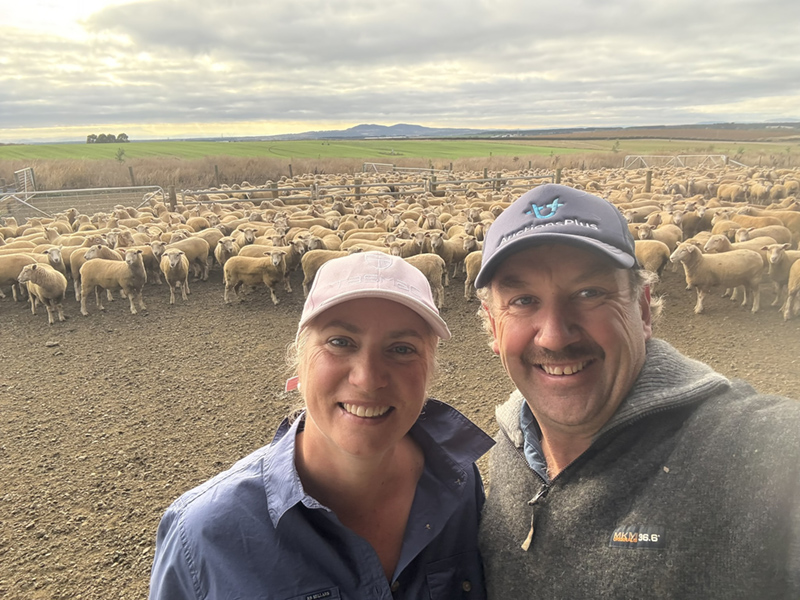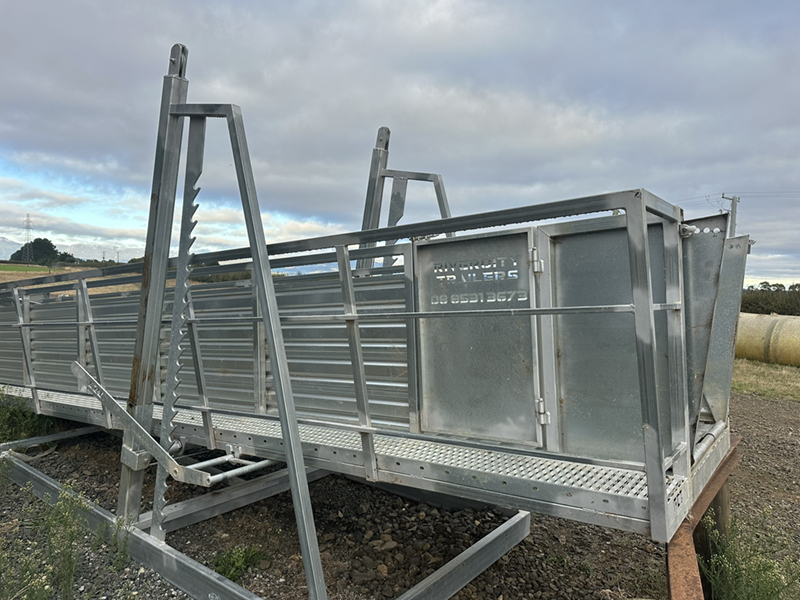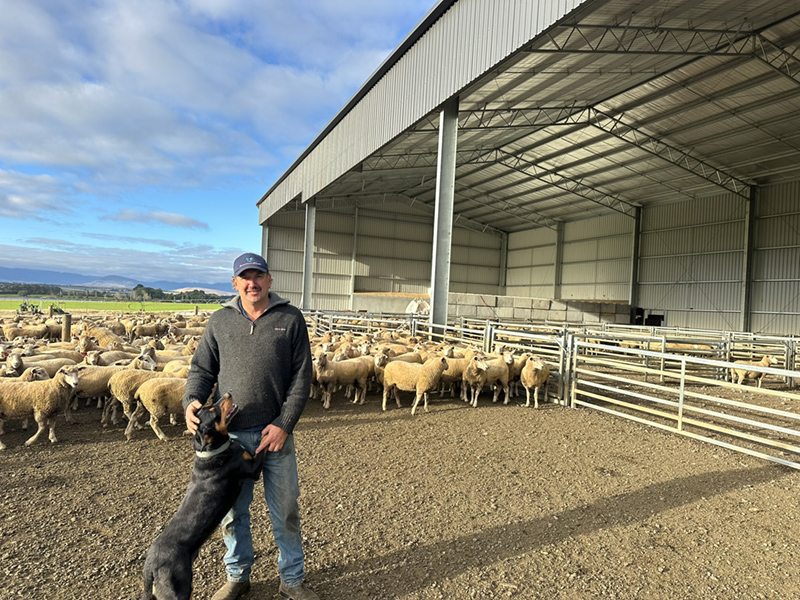 Sarah and Lauchie Cole, pictured on their Cressy property.
Sarah and Lauchie Cole, pictured on their Cressy property.
Preparation pays off: Tassie lambs travel clean and calm
Overcoming the complexities of transporting prime lambs across Bass Strait requires planning, clear communication, good relationships and a flexible approach.
A trio operating in northern Tasmania have mastered shipping to the mainland − ensuring lambs are consistently delivered to their destination clean, healthy and strong.
Cressy producers Lauchie and Sarah Cole send 420–500 finished lambs to Melbourne every second week, year-round, through Coles supermarket’s Graze Program.
Their livestock agent, Mark Webb of Webb and Woodiwiss Livestock Marketing, coordinates the process, while Melbourne-based livestock transporter Rob Hodge organises the trucks and liaises with the ship.
Lambs are collected from the Coles’ Cressy property and delivered in trailers to the wharf where they stay on the same trailer on the ship and onto the mainland, in a roll-on/roll-off system.
This system reduces stress and maximises safety, with minimal handling needed. The secure, purpose-built trailers protect the animals for the journey.
Good relationships and a flexible approach
Unpredictable weather, ocean swell and shipping authorities contribute to the complexity of transporting across Bass Strait.
“There’s no point being uptight and holding everyone to the nearest minute because things can change,” Mark said.
“There are guidelines in place – at times ships can only take livestock south and not north, it’s all because of the wave direction.”
Rob said the welfare of the lambs is always front of mind, with decisions made early and journeys cancelled if weather isn’t favourable.
“If at 6am we find out the ship isn’t taking livestock today, then I get on the front foot to Coles and let them know I haven’t got the 3,000 lambs coming tomorrow,” he said.
“I’m on the phone to Webby (Mark) and he is communicating with Lauchie and Sarah to work out the best place for the lambs.”

The Coles have invested in an adjustable ramp to streamline the loading process.
Preparation is key
The preparation of lambs before travel is critical for a successful journey.
“They need to be yarded before lunch and ideally shedded overnight,” Rob said.
“Pushing them into a shearing shed means they can be dry loaded in the morning, rather than having dew or frost on them.
“They empty out better standing on wooden or plastic batons in a raised shearing shed because they stand up and walk around more with the noise.
“If they don’t get up and move, they’re emptying out on the truck.”
A couple of hours difference in yarding sheep can have major impacts for the transporter, making trailers dirtier and taking longer to clean out.
“They need to be yarded before lunch. Otherwise it’s getting darker earlier, the lambs are laying down and not moving and emptying as well,” Rob said.
“Once I’ve unloaded the lambs, if they haven’t been prepared properly it takes me three hours to then get the trailer washed out and back on the boat. It ruins the whole cycle for the week.”
The Coles are improving their on-farm infrastructure – their yards are now covered and they have installed an adjustable ramp, which has improved the preparation for transport.
“The Coles’ preparation is A1,” Rob said.
“They shed lambs overnight, they have them weighted and counted and they are there to help load.”
Regular communication
As their agent, Mark catches up with the Coles at least three times a year.
“I like to give Sarah and Lauchie an update on markets − where we think they might be heading, what they were previously, what works and what doesn’t,” he said.
“We can talk about what classes of lambs and sheep may suit them going forward.
“It’s good if producers can continually talk to their agent and livestock transporter as well, to ensure everyone is on the same page.”

The Coles are improving their on-farm infrastructure. Lauchie is pictured with their yards, which are now covered.
Transport critical to success
Lauchie said running an integrated business means every part of the operation must be successful.
“Transport is a really important part of our business,” he said.
“It’s the success or non-success of Tassie lambs going to the mainland into the future.
“We have a really good relationship with our freight teams and our agent, Webby.
“He gives us good advice on preparing them.
“He will say on a Thursday night, ‘they’re going Tuesday next week, make sure they are crutched and fit for travel’.
“We have a large facility built for this process. It’s undercover, well ventilated, has fresh water and a four-deck loading ramp to make it easier for everyone involved.”
This collaborative approach has ensured the Coles have successfully transported 13,000–15,000 lambs a year for the past six years from Tasmania to the mainland without one incident.
“We do it bloody well. The lambs come off just as well as if they were travelling 5km away.
“They come off clean, they’re fit – that’s a good effort when they’ve been on a boat for 12 hours.”
Mutual respect
Mutual respect with a team of drivers and recognising each other’s needs contributes to the success of the operation, Lauchie said.
“It’s like any part of our business – you’ve got to make sure everyone understands what you are trying to achieve.
“Treat drivers with the respect they deserve. They are driving massive hours, sometimes loading difficult sheep in challenging yards.
“Give them respect, give them your time to help. Let them know if you’re running late. Give them good facilities to work in.
“It might be as simple as giving them a coffee if they’ve been driving all night. The little stuff makes a big difference.”



